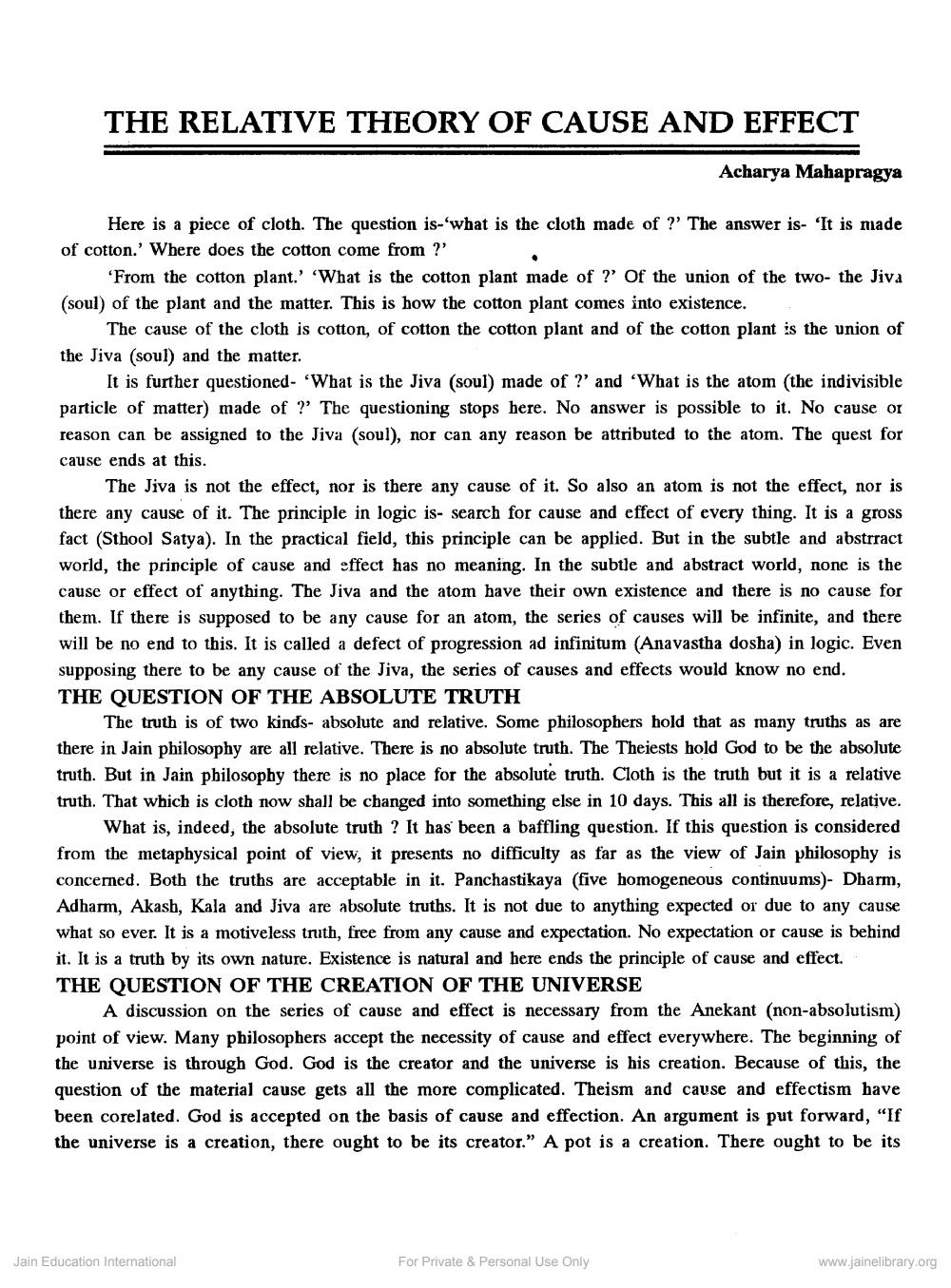________________
THE RELATIVE THEORY OF CAUSE AND EFFECT
Acharya Mahapragya
Here is a piece of cloth. The question is-'what is the cloth made of ?' The answer is- 'It is made of cotton.' Where does the cotton come from ?
'From the cotton plant.' 'What is the cotton plant made of ?' Of the union of the two- the Jiva (soul) of the plant and the matter. This is how the cotton plant comes into existence.
The cause of the cloth is cotton, of cotton the cotton plant and of the cotton plant is the union of the Jiva (soul) and the matter.
It is further questioned- 'What is the Jiva (soul) made of ?' and 'What is the atom (the indivisible particle of matter) made of ? The questioning stops here. No answer is possible to it. No cause or reason can be assigned to the Jiva (soul), nor can any reason be attributed to the atom. The quest for cause ends at this.
The Jiva is not the effect, nor is there any cause of it. So also an atom is not the effect, nor is there any cause of it. The principle in logic is- search for cause and effect of every thing. It is a gross fact (Sthool Satya). In the practical field, this principle can be applied. But in the subtle and abstrract world, the principle of cause and effect has no meaning. In the subtle and abstract world, none is the cause or effect of anything. The Jiva and the atom have their own existence and there is no cause for them. If there is supposed to be any cause for an atom, the series of causes will be infinite, and there will be no end to this. It is called a defect of progression ad infinitum (Anavastha dosha) in logic. Even supposing there to be any cause of the Jiva, the series of causes and effects would know no end. THE QUESTION OF THE ABSOLUTE TRUTH
The truth is of two kinds- absolute and relative. Some philosophers hold that as many truths as are there in Jain philosophy are all relative. There is no absolute truth. The Theiests hold God to be the absolute truth. But in Jain philosophy there is no place for the absolute truth. Cloth is the truth but it is a relative truth. That which is cloth now shall be changed into something else in 10 days. This all is therefore, relative.
What is, indeed, the absolute truth? It has been a baffling question. If this question is considered from the metaphysical point of view, it presents no difficulty as far as the view of Jain philosophy is concerned. Both the truths are acceptable in it. Panchastikaya (five homogeneous continuums)- Dharm, Adharm, Akash, Kala and Jiva are absolute truths. It is not due to anything expected or due to any cause what so ever. It is a motiveless truth, free from any cause and expectation. No expectation or cause is behind it. It is a truth by its own nature. Existence is natural and here ends the principle of cause and effect. THE QUESTION OF THE CREATION OF THE UNIVERSE
A discussion on the series of cause and effect is necessary from the Anekant (non-absolutism) point of view. Many philosophers accept the necessity of cause and effect everywhere. The beginning of the universe is through God. God is the creator and the universe is his creation. Because of this, the question of the material cause gets all the more complicated. Theism and cause and effectism have been corelated. God is accepted on the basis of cause and effection. An argument is put forward, “If the universe is a creation, there ought to be its creator." A pot is a creation. There ought to be its
Jain Education International
For Private & Personal Use Only
www.jainelibrary.org




